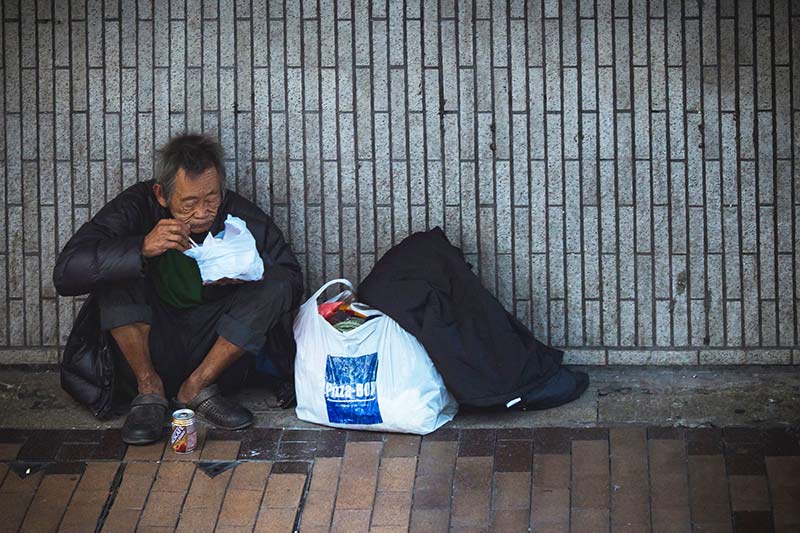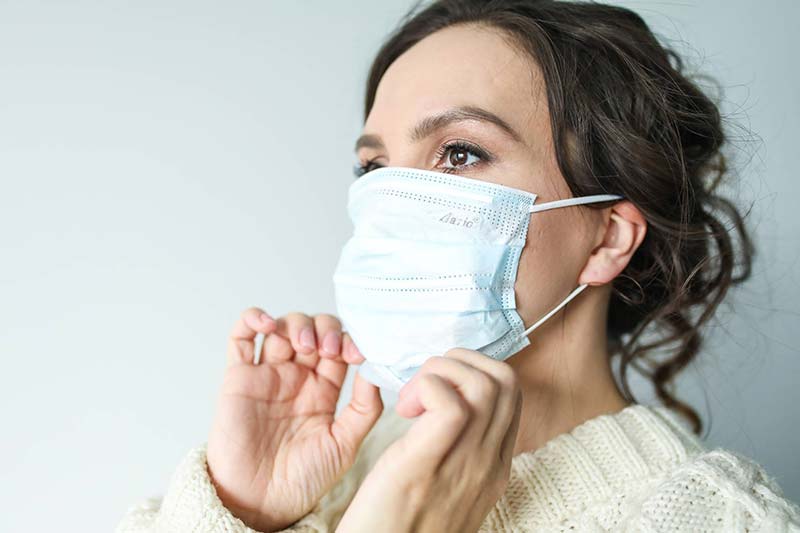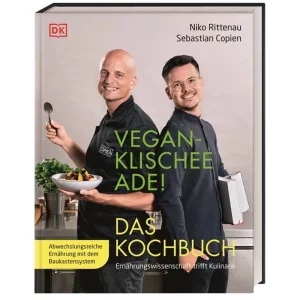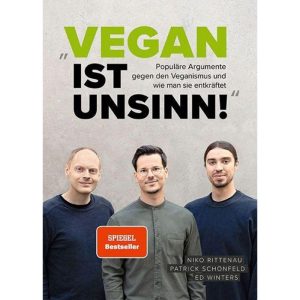What would the world look like if everyone was vegan? If you're interested in the answer to this question, you've come to the right place! As a vegan, I think this scenario is great, of course - but anyone who regularly eats animal-based foods should also be interested for good reasons.
The world won't be vegan overnight, of course! But perhaps "this veganism" has something deeper and more desirable to offer than simply a plant-based diet.
In this article, I would now like to Reasons for veganism and imagine together with you how life on earth could change for the better if everyone went vegan. A lot of subjunctive, but it's worth looking into the future 🙂
Notice: I try to keep the future scenarios short and have therefore linked further articles on each topic.
10 things that would happen if everyone went vegan
As a vegan, you become the solution to many ethical, social and ecological problems of our time contribute. The motives for a vegan life are in such an incredible variety that I can't even go into all the aspects.
Nevertheless, I venture here to paint a scenario of the most important changes in a completely vegan world that would be of great benefit to humanity. most likely to become reality sooner or later becomes. Let's go!
The following things would happen if the whole world went vegan:
1. no one goes hungry

Don't you think it's strangethat we have enough food to feed around 92 billion farm animals every year1 - but that at the same time around 733 million people in the world are going hungry?2
To produce one animal calorie, an average of seven plant calories are consumed.3 If we were to consume the plants directly and not feed them to billions of "farm animals", we could - scientifically proven - reduce the Stop world hunger.4
A completely vegan world would therefore be an extremely resource-friendly and not only animal-friendly but also a humane world.
Tip: More about the global famine can be found in the detailed linked article.
2. no animal suffers or dies for human pleasure
The Factory Farming is a brutal system. Not only when you see it through the eyes of the animals, but also when you see it through the eyes of the employees of slaughterhouses.
In a completely vegan world, slaughterhouses would be only remember the deedsthat we humans have done to animals in our evolutionary history.
However, one must in a vegan world not be afraid that cows, pigs and co. are completely threatened with extinction, when the Factory farming stopped has been. They are kept on life farms - in the care of people who love them rather than exploit them.
Some further articles for you:
- Vegan for ethical reasons
- Do animals have to die for milk?
- Why don't vegans drink milk?
- Animals must die for eggs
- Documentation "Dominion (be sure to check it out!)
3. man-made climate change is decelerating
Animal products such as meat and milk provide only 18 percent of the calories and around 37 percent of the protein in human consumption. But their production generates around 60 percent of all greenhouse gases from agriculture.5
This is not only due to the Transports of animals and feed, but also on the Methane emissions of cows. Animal husbandry for our consumption is therefore a major accelerator of the Climate change.
A completely vegan society would therefore be a society that significantly less or, in the best case, no longer at all would have to suffer from man-made climatic changes.
Some further articles for you:
- Connection climate and nutrition
- Stopping climate change - What everyone can do
- Will veganism solve the climate problem?
Tip: If you haven't read it yet, you should definitely take a look at my Book "Kochen fürs Klima" throw! There you will learn all about a fundamentally sustainable diet. If you like, get it here*.
4. deforestation of the rainforests is slowed down
Animal foods take up 83 percent of the land area, but produce only 18 percent of the calories we consume.6 It is therefore not surprising that the increasing demand for animal-based foods can only be met if further Natural areas destroyed be
More than 80 percent of the land-intensive soybean meal imported into Germany for Animal feed come from South America, for example7where large parts of the Amazon are Rainforest cut down.
If the whole world were vegan, the species-rich rainforest so no longer make way for our way of life.
Some further articles for you:
- Stopping deforestation - What everyone can do
- Soy as animal feed destroys rainforest
- Save rainforest - What everyone can do
5. we enjoy an incredible new variety of dishes

And this positive change applies not only to our own cooking, but also to the food we eat in restaurants. In a vegan world, we must not even give up typical meat products, such as burgers, steak, schnitzel or a salami pizza with cheese. The products are only plant-based.
The burger patty, for example, is made from Chickpeas and Amaranththe steak made from sides, the schnitzel made from Soy protein and the salami and cheese on the pizza from Peas and Coconut oil.
The cuisine of vegan food already holds so many new creations. What will the variety of dishes be like when the whole world goes vegan?
Cookbook tip: Cooking animal-friendly and vegan is actually pretty easy! With the recipes from the book "Vegan & Easy" by Bianca Zapatka* it gets even easier! 🙂
6. the oceans have recovered
It is not only the Marine animals that we humans eat, which leads to the Environmental problem of overfishing of the seas have led.
Every year, around 300,000 whales, dolphins and porpoises as well as tens of thousands of sharks, seabirds and turtles die as accidental by-catch industrial fishing.8
At the same time, trapping techniques such as the Trawlingthe seabed and the habitat of the animals.
In a vegan world, the oceans and all their creatures can recover. Because people would simply stop using the animals for consumption or to bring human entertainment out of the sea in dolphinaria.
Some further articles for you:
- Stop overfishing - What everyone can do
- Statistics and facts about overfishing of the oceans
- Why don't vegans eat fish?
7. the unique biodiversity on earth is preserved
Climate change, deforestation of the rainforests, the Land consumptionthe overfishing of the oceans, big game hunting: our behavior on the planet inevitably results in the Environmental problem of species extinctionthat is currently taking place.
Around 500,000 animal and plant species have already reached the Habitat necessary for long-term survival would be necessary, lost to us humans.9
In a vegan world, wild species reclaim their habitat as we humans leave alone.
Tip: At Stop species extinction find out now what you can do for the Biodiversity you can do.
8. people are less likely to suffer from water shortages
Each person consumes an average of around 1 million liters of water per year.10 We Germans alone consume around 4000 liters of "virtual water" per capita.11 This is the amount of water required for the entire manufacture of a product. Our Water Footprint is therefore extremely low.
In order to Environmental problem of water scarcity we have to realize that, for example, we have to more than 15,000 liters of water for one kilogram of beef are consumed.12
If the whole world were vegan, this would not automatically ensure clean drinking water forever. But the consumption of water and the Groundwater pollution with antibiotics, Liquid manure and other pollutants from factory farming would be much lower.
9. we humans get sick less often

On average, vegans are slimmer than vegetarians, who in turn are slimmer than meat eaters.13 And vegans fall ill are less likely to suffer from type 2 diabetes, cardiovascular diseases and less frequently from certain types of cancer.14
At the same time, a balanced, vegan diet is, according to American Dietetic Association Suitable for all phases of a person's life - including pregnancy.15
We must not expect to remain healthy in a sick environment as the only living beings. In a vegan world, we humans would definitely be healthier. Also pandemics like Corona or animal diseases like BSE would probably not exist.
Tip: About whether vegan is healthy or notI have written a very detailed article for you. Please take a look.
10. we humans treat each other more considerately and peacefully
How do you think it will affect our coexistence if we stop artificially impregnating cows, cutting the throats of pigs, or making little Shred chicks?
If we consciously decide to stop the exploitation of animals and the cruelty to animals generally, automatically creates an even more greater hurdle to do something bad to other people.
In a completely vegan world, human values such as Mercy, respect, compassion, love and Equality absolutely in the foreground. One is also vegan against violence. At the same time, causes of flight such as climate change or water scarcity are also reduced.
Some further articles for you:
"The whole world will never become vegan"
You have now learned about ten essential, positive consequences of veganism that can make the world a better place in the future. Unfortunately, not everyone knows them.
And that's why every now and then you get a vegan prejudice like "The whole world will never become vegan" to hear. It is primarily used to justify continuing to eat meat. However, the argument doesn't really make sense.
With the following answer you can give your counterpart the make understandable and incidentally advertising for the Veganism operate.
A logical response to this argument
I used to think that too. But at some point I realized that Veganism is more than just a passing trend. It is a A matter of the heartthat you don't suddenly stop doing. An attitude to life that eliminates so many injustices in the world - but also takes time.
You don't become a vegan because meat tastes so bad, but because your heart tells you that it is wrong to exploit, torture and kill animals for your own pleasure. The fact that 733 million people go hungry while we feed 92 billion farmed animals is also a Injustice.
And what do you think about the fact that the Soy cultivation for animal feed for example, is responsible for around 88 percent of the deforestation of the climate-protecting Amazon rainforest16 and thus depriving the majority of all animal and plant species living on earth of their habitat?
In addition, livestock farming is responsible for more greenhouse gas emissions than all ships, airplanes, trucks and cars combined.17 We live at the expense of the planet, other people and animals.
So veganism actually counteracts several injustices at once - that is the reason why at a certain point in the futureall people will be vegan.
The Changes in our eating habits have long been noticeable. There are more and more purely vegan restaurants and businesses with a larger vegan range. The variety of meat substitutes and other plant-based foods in supermarkets is growing. The number of vegans and vegetarians is also growing.
Veganism is the largest lifestyle movement in the world and brings our values back into line with our actions.
Book Tip: At this point, I would also like to recommend the book Vegan is nonsense! recommend. In it you will find all the typical prejudices and misconceptions surrounding the vegan lifestyle - and how to logically refute them.
Will we live to see a completely vegan world?
A world in which people no longer exploit animals for their own meals, entertainment, cosmetics or clothing, may sound utopian. Nevertheless, we are heading slowly but directly towards it.
But how long will it be before our global society is vegan? Looking at other, fundamental injustices in our society can at least help give a rough idea of the approximate duration of change. For example, it took around 400 years for slavery to be banned. Even though racism is still part of our society, the injustice of slavery has been eliminated.18
Speciesism - i.e. the unequal treatment of animals (some we pet, others we slaughter) - could, for example completed much faster due to digitization be. We will have no choice but to support this development and wait for the course of time.
"The greatness of a nation and its moral progress can be judged by the way its animals are treated."
Mahatma Gandhi (more at Animal welfare quotes)
Do you have any questions? And do you think there will ever be a vegan world? I look forward to hearing your thoughts below this article.
Stay compassionate,

PS: In my animal welfare blog you can learn many more things. For example, learn how to Protect animals in everyday life simply by following your heart.
References:
- K. Block: More animals than ever before - 92.2 billion-are used and killed each year for food (as of 05.06.2023), available at https://www.humanesociety.org/blog/more-animals-ever-922-billion-are-used-and-killed-each-year-food. [23.01.2025]. ↩︎
- Deutsche Welthungerhilfe e. V.: Hunger: Spread, Causes & Consequences, available at https://www.welthungerhilfe.de/hunger. [23.01.2025]. ↩︎
- Verbraucherzentrale Hamburg e. V.: Climate-friendly eating - here's how! (as at: 20.11.2024), available at https://www.vzhh.de/themen/lebensmittel-ernaehrung/klimafreundliche-ernaehrung/klimafreundlich-essen-so-gehts. [23.01.2025]. ↩︎
- M. Berners-Lee, C. Kennelly, R. Watson; et al. (2018): Current global food production is sufficient to meet human nutritional needs in 2050 provided there is radical societal adaptation, available at https://www.researchgate.net/publication/326488835_Current_global_food_production_is_sufficient_to_meet_human_nutritional_needs_in_2050_provided_there_is_radical_societal_adaptation. [23.01.2025]. ↩︎
- J. Poore; T. Nemecek (2018): Reducing food's environmental impacts through producers and consumers, available at https://t1p.de/3s9t. [23.01.2025]. ↩︎
- Earthday.org: Footprints for the future - our foods impact, available at https://www.earthday.org/our-foods-impact. [23.01.2025]. ↩︎
- Umwelthelden e. V.: Meat and soy: Why factory farming threatens the rainforest, available at https://www.abenteuer-regenwald.de/bedrohungen/fleisch-soja. [23.01.2025].
↩︎ - WWF Germany: Unwanted bycatch (as of 19.12.2022), available at https://t1p.de/9opg. [23.01.2025]. ↩︎
- Summary for policymakers of the global assessment report on biodiversity and ecosystem services of the Intergovernmental Science-Policy Platform on Biodiversity and Ecosystem Services, IPBES, 06.05.2019, p.13. ↩︎
- L. Jovanovic: Every person needs 1,000,000 liters of water per year (as of 15.08.2007), available at https://t1p.de/q3ch. [23.01.2025] ↩︎
- G+J Medien GmbH; Stern: Water consumption - 4000 liters - every person, every day (as of 13.02.2012), available at https://t1p.de/caxs. [23.01.2025]. ↩︎
- Federal Environment Agency: Hidden water (as of 22.03.2017), available at https://t1p.de/ddfg. [23.01.2025]. ↩︎
- E. A. Spencer, P. N. Appleby, G. K. Davey; et al. (2003): Diet and body mass index in 38000 EPIC-Oxford meat-eaters, fish-eaters, vegetarians and vegans, available at https://pubmed.ncbi.nlm.nih.gov/12833118. [23.01.2025]. ↩︎
- S. Tonstand, T. Butler, G. Fraser; et al. (2009): Type of vegetarian diet, body weight, and prevalence of type 2 diabetes https://pubmed.ncbi.nlm.nih.gov/19351712. [23.01.2025]. ↩︎
- American Dietetic Association; W. J. Craig; A. R. Mangels: Position of the American Dietetic Association: vegetarian diets (as of July 2009), available at https://pubmed.ncbi.nlm.nih.gov/19562864. [23.01.2025]. ↩︎
- OroVerde - Die Tropenwaldstiftung: Soja als Futtermittel - Tofu ist nicht das Problem, available at https://www.regenwald-schuetzen.org/regenwaldschutz-im-alltag/verbrauchertipps-im-alltag/fleischkonsum-und-soja/soja-als-futtermittel. [23.01.2025]. ↩︎
- Food and Agriculture Organization of the United Nations (FAO): livestock's long shadow environmental issues and options, available at https://www.fao.org/4/a0701e/a0701e00.htm. [23.01.2025] ↩︎
- A. Mendgen: 400 Jahre Unfreiheit (as at: 22.08.2019), available at https://t1p.de/6jqa. [23.01.2025]. ↩︎









